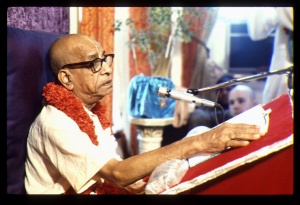SB 10.17.9

A.C. Bhaktivedanta Swami Prabhupada
TEXT 9
tatraikadā jala-caraṁ
garuḍo bhakṣyam īpsitam
nivāritaḥ saubhariṇā
prasahya kṣudhito 'harat
SYNONYMS
tatra—there (in that lake); ekadā—once; jala-caram—an aquatic creature; garuḍaḥ—Garuḍa; bhakṣyam—his proper food; īpsitam—desired; nivāritaḥ—forbidden; saubhariṇā—by Saubhari Muni; prasahya—taking courage; kṣudhitaḥ—feeling hunger; aharat—he took.
TRANSLATION
In that very lake Garuḍa had once desired to eat a fish-fish being, after all, his normal food. Although forbidden by the sage Saubhari, who was meditating there within the water, Garuḍa took courage and, feeling hungry, seized the fish.
PURPORT
Śukadeva Gosvāmī is now explaining why Garuḍa could not approach the lake in the Yamunā River. It is the nature of birds to eat fish, and thus, by the arrangement of the Lord, the great bird Garuḍa does not commit any offense by nourishing himself with fish. On the other hand, Saubhari Muni's forbidding a much greater personality to eat his normal food did constitute an offense. According to Śrīla Viśvanātha Cakravartī Ṭhākura, Saubhari committed two offenses: first, he dared to give an order to a supremely exalted soul like Garuḍa, and second, he obstructed Garuḍa from satisfying his desire.